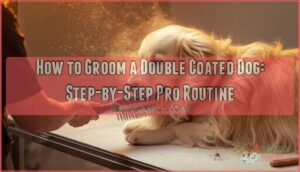This site is supported by our readers. We may earn a commission, at no cost to you, if you purchase through links.

Assess if you can meet exercise needs, then match to your lifestyle.
If you lack time, space, or patience, reconsider now before problems arise.
Providing proper physical and mental stimulation will ensure a rewarding relationship.
Let’s explore the best Husky hybrids so you find your perfect energetic yet loving companion.
Table Of Contents
- Key Takeaways
- Consider Your Lifestyle
- Grooming Needs
- Training Considerations
- Exercise Requirements
- Potential Health Issues
- Ideal Home Environments
- Finding a Responsible Breeder
- Frequently Asked Questions (FAQs)
- What is the average lifespan of a husky mix breed?
- How much on average does it cost per year to care for a husky mix?
- What are some alternatives if I cannot provide 2+ hours of high intensity exercise per day?
- Will a husky mix get along with my existing pets like cats or small dogs?
- Is it possible to have a husky mix if I live in a warm climate?
- Conclusion
Key Takeaways
- Evaluate your activity level, space constraints, and ability to commit substantial time daily to exercising, training, and interacting with a high energy dog before choosing a husky mix.
- Consider lower shedding, more compact husky mixes like Pomskies or Aussie-Siberian mixes if space is limited, but ensure fencing is very secure.
- Huskies require patience and persistent positive reinforcement training methods using food rewards and praise due to their intelligence yet stubborn nature.
- Commit to thorough two or three times weekly brushings and monthly baths to manage shedding and maintain their beautiful thick double coats with regular grooming.
Consider Your Lifestyle
When choosing a Husky mix, first reflect honestly on your:
- Activity level
- Space constraints
- Time commitment
Huskies require:
- Consistent training
- Ample room to run
- Substantial time spent exercising and interacting
If your lifestyle doesn’t align with a Husky’s high needs, consider a lower maintenance companion that fits your home.
Activity Level
Depending on your active lifestyle, Husky mixes typically require regular vigorous exercise to stay fit and prevent behavior problems like destructive chewing.
High-energy breeds like Huskies demand daily activity to channel their natural instincts constructively.
Without sufficient exercise, these intelligent dogs may act out with zoomies, barking, digging, and chewing.
Carefully evaluate your activity level and dedicate ample time for walks, runs, play sessions, or other vigorous exercise when considering a Husky mix.
An activity level mismatch leads to bored, frustrated dogs and disappointed owners.
Space Constraints
Two key space constraints to account for when considering a Husky mix are:
- Their high energy levels, which demand ample room to run around.
- Their tendency to be escape artists, requiring secure fencing of yards.
Here are 4 space-saving husky mixes to consider:
- Pomskies:
- These petite pooch crosses between Siberian Huskies and Pomeranians thrive in small spaces while retaining affectionate traits of both parent breeds.
- Husky-Corgi mixes:
- Their moderately compact size suits apartments yet still needs brisk walks.
- Their fluffy coats shed heavily.
- Alusky:
- The Alaskan Malamute and Siberian Husky hybrid has a thick fur coat requiring frequent brushing and vacuuming yet appreciates cozy quarters.
- Aussie-Siberian mixes:
- Fairly compact herders, they intensely bond with their families while needing mental stimulation.
- Secure fencing is a must.
Time Commitment
Your husky mix will require a considerable time commitment for exercise, training, grooming, and bonding.
Assessing if you can dedicate substantial time daily and consistently to a husky mix is pivotal.
From housebreaking and obedience training a pup to providing adequate physical and mental stimulation for an adult dog, you must evaluate your lifestyle and time availability.
Rashly choosing this intense breed without this evaluation often culminates in frustrated owners and distressed dogs.
Investing the necessary time upfront in a husky mix leads to a rewarding companionship.
Grooming Needs
When considering a husky mix, understand that these dogs shed moderately to heavily and require regular brushing and occasional bathing.
Commit to a consistent grooming routine including thorough brushings two to three times a week to manage shedding and keep the dog’s coat healthy.
Be prepared for ongoing grooming responsibilities if you welcome one of these striking yet demanding dogs into your home.
Shedding
Matching Lifestyle, Training Needs, and Health:
How much are you willing to clean up heavy shedding when considering a husky mix? Invest in quality brushes, vacuum frequently, and brush them outside.
Shedding solutions include:
- Brushing thoroughly once or twice a week
- Bathing monthly or as needed
- Using deshedding tools and anti-shedding products
Regular grooming maintenance is crucial with these mixes’ thick double coats.
Don’t overlook this significant commitment.
Bathing
Fulfillment comes as you’re determining bathing frequency for your Husky mix based on their coat, skin sensitivity, and activity levels.
Balance regular bathing for coat maintenance with avoiding over-drying sensitive skin.
Monitor Husky mix breed coats and bathe when dirt builds up, using lukewarm water, grooming tools, and bath time tips to clean while maintaining skin and coat health.
Tailor bathing to the unique needs of each dog to optimize lifestyle, training routines, and lifelong health.
Brushing
Two of the best ways to maintain your husky mix’s coat are regular brushing and combing.
- Invest in quality brushes and combs to prevent skin irritation.
- Brush at least weekly to control shedding and prevent matting.
- Pay special attention to areas prone to tangles like ears, legs, and tail.
- Schedule professional grooming every 6-8 weeks for a thorough brush out.
- Consistent grooming promotes coat health and strengthens your bond.
Training Considerations
When considering a husky mix, you’ll need to carefully evaluate your ability to train them.
As intelligent yet often stubborn dogs, huskies require extensive socialization and firm, patient handling to curb strong instincts.
Success will depend greatly on committing fully to husky training needs.
Intelligence
Husky mix breeds are highly intelligent and independent dogs.
This combination can make training challenging.
Provide plenty of mental stimulation and choose a mix based on your capability to actively train and enrich their agile minds.
Select a husky mix based on your capability and commitment to providing cognitive enrichment and training.
Stubbornness
You’ll need to have patience when training a Husky mix due to their known stubborn tendencies.
Use positive reinforcement techniques like food rewards and praise.
Keep training sessions short to avoid boredom.
Teach basic commands like sit, stay, and come first before moving to more complex behaviors.
Be firm, consistent, and patient – it may take many repetitions before they respond reliably.
Socialization
Due to their stubborn tendencies, you’ll need to start socializing your husky mix early on.
- Regular exposure to a wide range of people, animals, sights, sounds, and situations.
- Introduce your puppy to various environments and scenarios to ensure proper social development.
- This builds confidence, reinforces commands, and prevents problematic behaviors down the road.
| When | What | Why |
|---|---|---|
| 8-12 weeks | Puppy kindergarten | Early, positive experiences |
| 4-6 months | Dog parks/daycare | Meet dogs, people |
| Ongoing | Walks, outings | Maintain social skills |
Exercise Requirements
You’d be remiss not factoring in sufficient physical activity when deciding between husky mixes, as their exercise needs tend to be demanding.
As Northern working breeds, most husky mixes need at least 60-90 minutes of vigorous exercise daily.
Choose a husky mix suited for your active lifestyle – one that will thrive on long walks, runs, hikes, bikejoring, canicross, sledding, or other outdoor activities providing mental and physical stimulation.
Supplement with indoor exercise and interactive playtime varieties.
If less active, consider a lower energy husky mix and provide enriching mental stimulation.
Research hereditary conditions and dietary needs when choosing a husky mix.
With informed lifestyle matching, you can find the right husky mix to fill your life with affectionate adventure.
Potential Health Issues
As you consider which husky mix is right for your home, you’ll need to research common health problems.
Hip dysplasia, eye issues like cataracts, and thyroid dysfunction are seen in many husky crosses.
Discuss these possible concerns with any breeder or rescue group to ensure you can properly care for your new furry friend.
Hip Dysplasia
You should know that some husky mixes may inherit a predisposition for hip dysplasia from their parents.
As husky experts, we recommend being proactive about preventing hip dysplasia through proper nutrition, exercise, and veterinary care.
Maintain your dog’s healthy weight, provide age-appropriate exercise, feed quality food, and supplement with glucosamine.
Schedule annual vet exams to monitor hip health.
Together we can raise awareness and manage potential hip issues in husky mixes.
Eye Problems
Since huskies can be prone to developing certain eye problems, you’ll want to stay on top of vet checkups to monitor for conditions like cataracts, glaucoma, or progressive retinal atrophy.
As a husky breeder, I recommend establishing a relationship with a trusted veterinary ophthalmologist to conduct annual eye exams and catch issues early.
Choose responsible breeders who screen for genetic diseases and provide transparency into parent health.
Preventive measures like these, combined with proper training techniques emphasizing guidance not punishment, will promote good eye health in your husky mix.
Thyroid Problems
Compound noun issues with your dog’s thyroid gland should be on your watch list when considering a husky mix.
These active breeds often suffer inadequate thyroid hormone production, prompting weight gain and skin conditions despite normal appetite and diet.
Support optimal thyroid function through veterinary care, blood testing, supplements, diet adjustments focusing on bioavailable nutrients and iodine sources.
Behavior changes like lethargy and anxiety also suggest thyroid trouble.
Accounting for husky health risks like thyroid dysfunction from the start facilitates responsible pet selection and ownership.
Ideal Home Environments
When considering a husky mix, you’ll first need to evaluate:
- If you have adequate yard space.
- If you have an appropriate climate.
Also contemplate:
- How another dog may impact any current pets regarding compatibility.
- Hierarchy disputes.
- Training overlap.
Yard Space
The ideal home environment for a Husky mix includes:
- Ample yard space for play and exercise.
- As high-energy dogs accustomed to wide open spaces, they need room to expend their energy.
Providing sufficient outdoor access prevents problem behaviors from developing out of boredom or confinement.
Climate
You’ll also want to consider climate when deciding if a Husky mix is right for your home.
As a Husky rescue leader and breed advocate, I recommend cold climates for Husky mixes. Their ancestry as hard-working sleigh dogs for the Chukchi people means they thrive best in frigid temperatures.
Maintain indoor temperatures under 75°F, limit intense summer activity, and take preventative measures against overheating.
Their thick coats adapt them perfectly for winter, though do provide indoor warmth.
Other Pets
You’d be wise pairing this energetic breed with other active pets that can match their stamina and exercise needs.
Exuberant husky mixes may overwhelm low-energy or elderly pets.
When introducing pets, go slow and watch body language carefully.
Multi-pet households require time for proper socialization and training.
Finding a Responsible Breeder
As you search for your perfect husky mix pup, be sure to find a responsible breeder.
- Health tests their dogs.
- Allows you to meet the puppies’ parents.
- Provides a contract detailing health guarantees.
Reputable breeders focus on breeding happy, healthy pups and bettering the breed, not making a quick profit.
Taking the time upfront to vet breeders thoroughly will give you confidence that your new furry family member will have the best chance at a long, fulfilling life.
Health Certifications
Your search for a responsible breeder should start with confirming their commitment to health.
This transparency indicates a breeder focused on puppy wellness.
This includes:
- Verifying the parent dogs have earned all breed-recommended health certifications.
- Genetic testing.
- Vet references.
- Commitment to lifelong learning about bettering the breed.
Meeting Parents
Seeing your potential puppy’s parents allows insight into temperament and prediction of size.
When choosing breeders, request to meet both parents. This grants understanding of behavioral tendencies and health histories firsthand.
Responsible ownership requires proper preparation and emotional investment to cope with challenges.
Discuss training, medical records, and lifestyle suitability with ethical, certified breeders prioritizing your future pup’s wellbeing over profit.
Matching an ideal husky mix breed relies on finding the right breeder committed to your family.
Contract and Health Guarantee
An ethical breeder provides a contract outlining their responsibilities and your ownership rights.
Vet your breeder carefully, as a health guarantee legally binds them to stand behind the pup should issues arise.
Requiring diagnostic tests done by licensed vets protects you further.
Let no red flags go unchecked—a good breeder willingly answers all questions.
Frequently Asked Questions (FAQs)
What is the average lifespan of a husky mix breed?
The average lifespan of a husky mix breed is typically 12-15 years.
Proper nutrition, exercise, veterinary care, and a stimulating home environment are key to supporting your dog’s long-term health and lifespan potential.
Choosing the right husky mix for your lifestyle will give your canine companion their best opportunity to live a full, active life by your side.
How much on average does it cost per year to care for a husky mix?
When caring for a high-energy husky mix, costs can feel like they’re skyrocketing!
Expect around $1500-2000 annually for:
- Food
- Medical care
- Grooming
- Accessories
- Training
As pack animals, proper physical and mental exercise are imperative, so factor that in too.
With patience and preparation, you’ll reap the rewards of a delightful companion.
What are some alternatives if I cannot provide 2+ hours of high intensity exercise per day?
Consider a lower energy breed better suited to your lifestyle.
Huskies require intense exercise; without an outlet for their energy, they may develop problem behaviors.
Meet available dogs to find one whose needs match what you can realistically provide.
The right fit will lead to a happy home for both of you.
Will a husky mix get along with my existing pets like cats or small dogs?
When introducing a husky mix to resident pets, proceed with caution. Their high prey drive can overwhelm small animals.
With proper conditioning and vigilant supervision, peaceful coexistence may be possible. However, huskies will likely never be reliable off-leash companions for cats or tiny dogs.
Carefully managing interactions is key.
Is it possible to have a husky mix if I live in a warm climate?
While huskies can adapt to warm climates, their thick coats make them prone to overheating.
Providing ample shade, water, and exercise opportunities like swimming can help them stay cool and content.
But their high activity needs generally make huskies better suited to cooler areas regardless of mix.
Conclusion
As a longtime husky rescuer, I’ve seen these clever pups end up abandoned when families can’t meet their needs.
But with honest self-reflection about your lifestyle, and choosing the right hybrid like a Husky-Lab or Husky-Shepherd for an active home, you’ll share your life with a devoted adventure buddy.
Match exercise needs, stimulate their mind, provide structure through training, and your energetic yet affectionate new best friend will thrive by your side in harmony.













